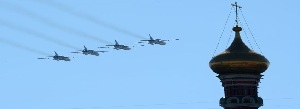Motives Unclear for Russian Flights Over NATO Airspace
Motives Unclear for Russian Flights Over NATO Airspace

NATO on Wednesday said it detected “an unusual level of air activity” by a number of Russian flights in European airspace this week. Four different groups of Russian military aircraft flew over the Baltic Sea, North Sea, Atlantic Ocean and Black Sea the same week NATO Secretary-General Jens Stoltenberg gave his first major speech addressing the alliance's relationship with Russia.
Eight Russian aircraft flew over the North Sea Wednesday, with six turning back toward Russia and two continuing to the Atlantic Ocean. The Norwegian air force scrambled in response to the aircraft flying in formation, as did aircraft from the United Kingdom that responded to the two bombers that continued on. Other aircraft from the Portuguese air force and NATO forces were involved as well.
Also on Wednesday, four Russian aircraft were detected and intercepted by the Turkish air force in international airspace over the Black Sea, and multiple Russian planes were detected over the Baltic Sea. Portuguese fighters scrambled in response, and the aircraft returned to Russian airspace.
“NATO allies protect their airspace on a 24/7 basis. Allied air defense efforts are focused on stopping unauthorized incursions into NATO airspace and on preventing acts of airborne terrorism,” NATO said following the Russian action.
The bombers and tankers that flew over the North Sea and Atlantic Ocean did not file flight plans or have radio communication with civilian air traffic control officials, posing a risk to civilian flights. Though NATO said the Russian aircraft were continually tracked, Russia already has conducted about three times the number of such flights this year than last, with NATO conducting over 100 intercepts of Russian aircraft so far in 2014. It is standard procedure for the alliance to scramble and intercept similar aircraft it detects over NATO airspace, the alliance said.
Add new comment